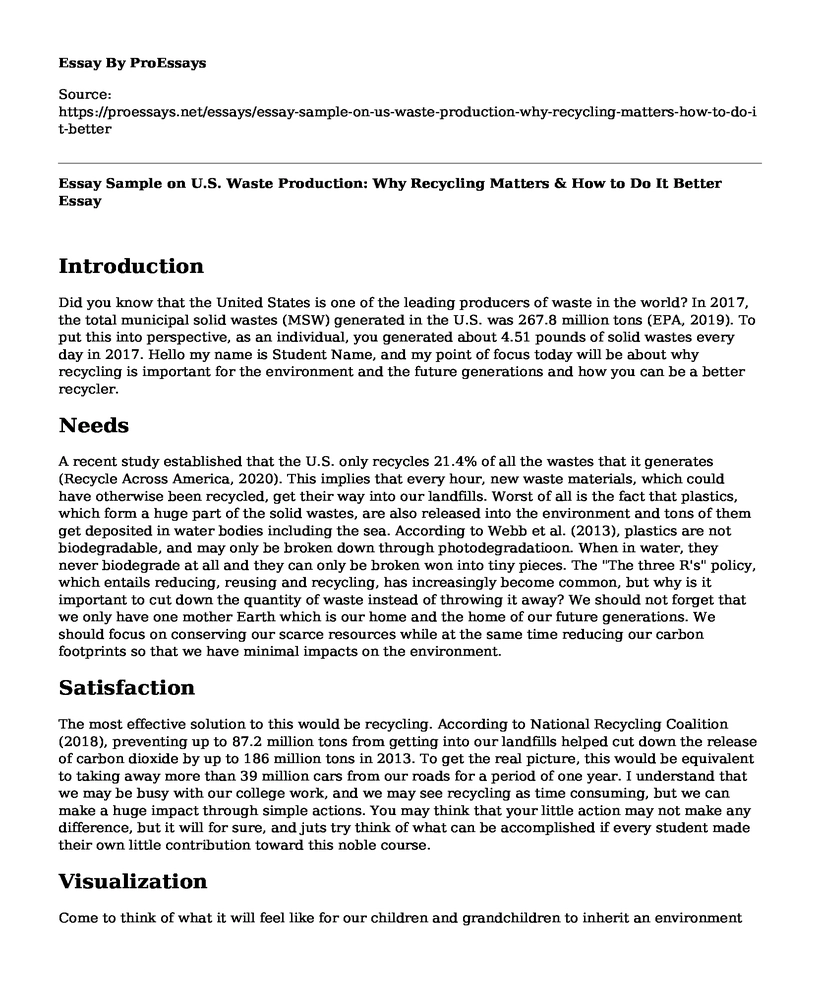Introduction
Did you know that the United States is one of the leading producers of waste in the world? In 2017, the total municipal solid wastes (MSW) generated in the U.S. was 267.8 million tons (EPA, 2019). To put this into perspective, as an individual, you generated about 4.51 pounds of solid wastes every day in 2017. Hello my name is Student Name, and my point of focus today will be about why recycling is important for the environment and the future generations and how you can be a better recycler.
Needs
A recent study established that the U.S. only recycles 21.4% of all the wastes that it generates (Recycle Across America, 2020). This implies that every hour, new waste materials, which could have otherwise been recycled, get their way into our landfills. Worst of all is the fact that plastics, which form a huge part of the solid wastes, are also released into the environment and tons of them get deposited in water bodies including the sea. According to Webb et al. (2013), plastics are not biodegradable, and may only be broken down through photodegradatioon. When in water, they never biodegrade at all and they can only be broken won into tiny pieces. The "The three R's" policy, which entails reducing, reusing and recycling, has increasingly become common, but why is it important to cut down the quantity of waste instead of throwing it away? We should not forget that we only have one mother Earth which is our home and the home of our future generations. We should focus on conserving our scarce resources while at the same time reducing our carbon footprints so that we have minimal impacts on the environment.
Satisfaction
The most effective solution to this would be recycling. According to National Recycling Coalition (2018), preventing up to 87.2 million tons from getting into our landfills helped cut down the release of carbon dioxide by up to 186 million tons in 2013. To get the real picture, this would be equivalent to taking away more than 39 million cars from our roads for a period of one year. I understand that we may be busy with our college work, and we may see recycling as time consuming, but we can make a huge impact through simple actions. You may think that your little action may not make any difference, but it will for sure, and juts try think of what can be accomplished if every student made their own little contribution toward this noble course.
Visualization
Come to think of what it will feel like for our children and grandchildren to inherit an environment where the beaches are covered by tons of trash, with plastic bags and bottles covering large water bodies, glass shards mixed with sand, and heavy smog in the sky just to mention a few. This will be the situation if we fail to take the action, however trivial it may be. I assure you that you have all that it takes to give the future generation a better environment than you received from your forefathers. Always strive to make your contribution in ensuring that the environment is clean, and this you can do through recycling.
Conclusion (Action Step)
An average person I sin a position to recycle well over 25,000 cans throughout their lives (Recycle Across America, 2020). This is not a small number and I assure you that anything that you will do will be of great help. You may start by disposing the bottle that you use at home or in school in a designated bin. You can then go an extra mile to buy recycled items and sensitize your community on the need to recycle (Denchak, 2016). What you should also know is that you can earn extra money from recycling, and this is good news for you as a college student who needs exploit every opportunity to make cash. So I urge you to commit yourself to reduce, reuse, and to recycle.
References
Denchak, M. (2016). Recycling: Beyond the bin. Retrieved from https://www.nrdc.org/stories/recycling-beyond-bin
EPA. (2019). National overview: Facts and figures on materials, wastes and recycling. Retrieved from https://www.epa.gov/facts-and-figures-about-materials-waste-and-recycling/national-overview-facts-and-figures-materials
National Recycling Coalition. (2018). Fact Sheets CURe ZW. Retrieved form https://nrcrecycles.org/glossary-3/?doing_wp_cron=1582600553.0281860828399658203125
Recycle Across America. (2020). Recycling is in a serious crisis. So let's fix it, shall we? Retrieved from https://www.recycleacrossamerica.org/recycling-facts
Webb, H. K., Arnott, J., Crawford, R. J., & Ivanova, E. P. (2013). Plastic degradation and its environmental implications with special reference to poly (ethylene terephthalate). Polymers, 5(1), 1-18.
Cite this page
Essay Sample on U.S. Waste Production: Why Recycling Matters & How to Do It Better. (2023, Apr 10). Retrieved from https://proessays.net/essays/essay-sample-on-us-waste-production-why-recycling-matters-how-to-do-it-better
If you are the original author of this essay and no longer wish to have it published on the ProEssays website, please click below to request its removal:
- Essay Sample on Climate Change: Human vs Natural Causes
- Essay Sample on Oil Dispersants: Evaluating Risks of Exposure to Marine Species
- Improve the World Essay
- Essay Example on Leadership in Disaster: The 3 C's of Command, Control, and Curbing
- Essay Example on Wind Power Plants: Establishing Clean Energy Projects
- Global Warming: Human Impact and Climatic Changes - Essay Sample
- Disaster Preparedness - Free Report Sample







